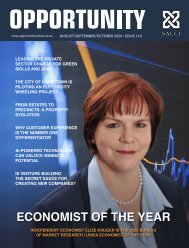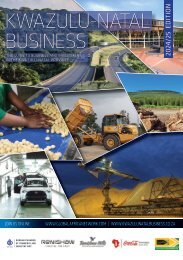KwaZulu-Natal Business 2016-17 edition
The 2016-17 edition of KwaZulu-Natal Business is the eighth issue of this highly successful publication that, since its launch in 2008, has established itself as the premier business and investment guide to the KwaZulu-Natal province in South Africa. The province is unique in terms of its abundant natural and human resources, and is also one of the key drivers behind the South African economy. To complement the extensive local, national and international distribution of the print edition of the magazine (15 000 copies), the full content can also be viewed online at www.kwazulunatalbusiness.co.za. Updated information on KwaZulu-Natal is also available through our monthly e-newsletter, which you can subscribe to online at www.globalafricanetwork.com, in addition to our other business-to-business titles that cover all nine provinces, complemented by our flagship publication, South African Business.
The 2016-17 edition of KwaZulu-Natal Business is the eighth issue of this highly successful publication that, since its launch in 2008, has established itself as the premier business and investment guide to the KwaZulu-Natal province in South Africa.
The province is unique in terms of its abundant natural and human resources, and is also one of the key drivers behind the South African economy.
To complement the extensive local, national and international distribution of the print edition of the magazine (15 000 copies), the full content can also be viewed online at www.kwazulunatalbusiness.co.za.
Updated information on KwaZulu-Natal is also available through our monthly e-newsletter, which you can subscribe to online at www.globalafricanetwork.com, in addition to our other business-to-business titles that cover all nine provinces, complemented by our flagship publication, South African Business.
You also want an ePaper? Increase the reach of your titles
YUMPU automatically turns print PDFs into web optimized ePapers that Google loves.
SPECIAL FEATURE<br />
Although mining plays a far<br />
smaller role in the economy than<br />
it used to, it still contributes significantly<br />
to GDP, employment<br />
and taxation income. Demand<br />
for platinum, iron ore and manganese<br />
from the new global<br />
powerhouses of China and India<br />
is motivating investment in the<br />
sector in South Africa.<br />
Mining companies account<br />
for about a third of the market<br />
capitalisation (R1.86-trillion) of the<br />
country’s stock exchange, the JSE.<br />
One of South Africa’s fastestgrowing<br />
manufacturing sectors,<br />
catalytic converters, also owes<br />
its existence to the minerals that<br />
make up the converters, and one of the central<br />
planks of the South African government’s economic<br />
policy is to ensure that value is added to the<br />
country’s mineral resources. The country already<br />
has many steel mills and aluminium smelters,<br />
but many thousands of tons of raw materials are<br />
exported in their raw state. A number of Industrial<br />
Development Zones and Special Economic Zones<br />
have been set up and promulgated in order to attract<br />
investment as well as to increase local manufacturing<br />
capacity.<br />
The automotive industry is one of South Africa’s<br />
most important sectors and accounts for about 12%<br />
of South Africa’s manufacturing exports, with many of<br />
the major multinationals using South Africa to source<br />
components and assemble vehicles for both local and<br />
international markets.<br />
Dube TradePort's head office, 29 0 South.<br />
The country has been through a challenging period<br />
during which there have been serious energy constraints.<br />
These have proved to be an impediment<br />
to economic growth and a major inconvenience to<br />
everyone in the country. Overcoming the challenge<br />
was uppermost in government’s programme.<br />
"Government is doing everything within its<br />
power to deal with the problem of energy shortage<br />
in the country. We are quite aware of the fact<br />
that this is indeed a difficult period, but it shall pass<br />
because we do have strategies in place to deal with<br />
this matter," Zuma said.<br />
Government has developed a sustainable plan<br />
that involves short-, medium- and long-term capacity<br />
and infrastructure development, beginning with a<br />
plan for improved maintenance of existing Eskom<br />
power stations, enhancing the electricity generation<br />
capacity and managing the electricity demand. The<br />
long-term plan involves finalising South Africa’s longterm<br />
energy security master plan.<br />
"As a priority we are going to stabilise Eskom’s<br />
finances to enable the utility to manage the current<br />
period," said Zuma, adding that government<br />
was supporting Eskom with R23-billion for the <strong>2016</strong><br />
fiscal year.<br />
Energy<br />
Agriculture<br />
Agriculture is a catalyst for growth and food security<br />
and there is a strong public-private sector drive to<br />
develop an Agricultural Policy Action Plan aimed<br />
at bringing one-million hectares of under-utilised<br />
land into full production over the next three years.<br />
"Among key interventions this year, we will promote<br />
the establishment of agri-parks or cooperatives<br />
and clusters in each of the 27 poorest district<br />
KWAZULU-NATAL BUSINESS <strong>2016</strong>/<strong>17</strong><br />
56


















